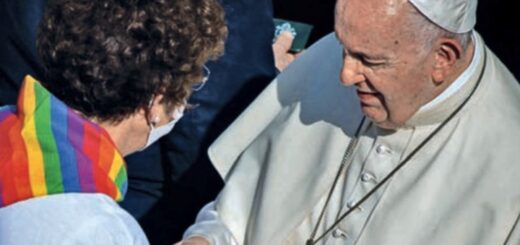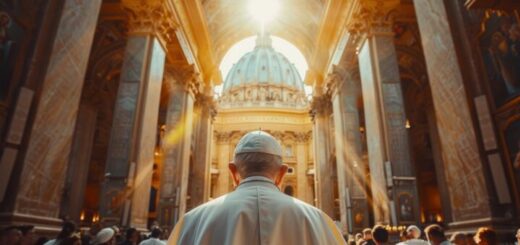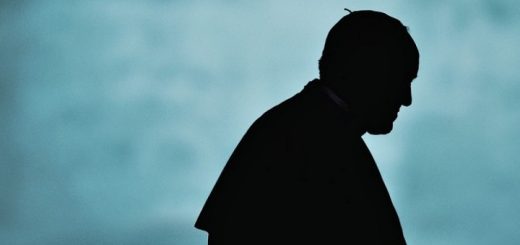Sant'Ambrogio, Teodosio and the Gay Auriga
Reflections by Gianni Geraci*
It is difficult, after more than one thousand five hundred years, to judge in the light of the values we have, a figure made of lights and shadows such as that of Sant'Ambrogio. It is also difficult because, in some episodes of which he was the protagonist, it is not clear to establish the role he had.
Ambrogio, Priscilliano and Santiago de Compostela
An example is the role he played in relation to the martyrdom of the priscillian bishop of Avila, the first heretic entrusted by the Catholic Church to civil power and, for this reason, executed in 385. Priscilliano preached a strong asceticism and, above all, was hostile to the growing intertwining of interests that was being affirmed between the ecclesiastical authorities and imperial power.
He was also accused of professing heterodox ideas on the nature of Jesus and on trinitarian theology, as well as practicing magic. Some Spanish bishops, led by Merida's Idazio, first launched, first through the convening of a Council in Zaragoza, then with a series of letters aimed at obtaining the conviction of the rival. Certainly that written in Ambrogio was not secondary, because immediately after the emperor Graziano, on which Ambrogio had a strong ascendant, condemned Priscianian, raised him from the episcopal office of Avila and turned him off.
The fact is that the hostility towards Priscilliano of two important bishops such as Ambrogio, bishop of Milan and Damaso, pope and bishop of Rome, allowed Idazio to unleash all his hostility towards the rival, motivated also by the growing success that had the ideas of Priscilliano in the Iberian peninsula, not so much for their alleged heterodox characteristics, but for their adherence to simplicity. of the Gospel message and for the fact that they strongly denounced the growing mix between political power and ecclesiastical authority.
In fact, he managed to obtain from Magno Clemente Massimo who, in the meantime, had settled in Treviri as Cesare delle Gallie, the call of rival at the imperial court and his beheading. The attempt of Martino, bishop of Tours, to exonerate the one who, in his opinion, was nothing more than the victim of a conspiracy carried out by bishops colluded with the temporal power, had nothing to do with it.
After the execution of Priscilliano there were many voices that raised to condemn that crime. Among these there was also that of Ambrogio (who in Martino di Tours, among other things, was very attached) who, however, had some responsibilities, since he certainly could not be unrelated to the condemnation of Priscilliano made some time before, by Graziano.
Before continuing, it is worth following briefly to follow the story of Priscilliano whose body, according to an alternative tradition to the official one, would be the one that is revered as a body of San Giacomo Maggiore in the Sanctuary of Santiago de Compostela. According to this tradition, the presence of the relics of a much loved bishop is due as Priscilliano the great success that Santiago de Compostela had as a destination for pilgrimages from all over the Iberian peninsula since the first centuries of the Middle Ages.
Ambrogio, Giustina and religious freedom
One of the elements that can explain the detachment with which Ambrogio dealt with poor Priscilliano is certainly the different vision that had relations between political power and ecclesiastical authority. Predictor convinced of evangelical simplicity and renunciation of any influence on worldly things, Priscilliano could not find Ambrogio's approval which, on the other hand, influenced the imperial curia in more than one circumstance.
From his point of view, one of the tasks of political power was in fact to support the instances of the Church against non -Christian religions and against heresies. On the other hand, the episodes that attest this highly theocratic point of view are more than one.
The first is the clash with the imperator Giustina who, being close to Arianism, in the name of religious pluralism, after the death of the emperor Graziano, as a guardian of the new Emperor Valentinian II, ordered Ambrogio to sell to the Arians one of the basilicas of the city of Milan.
Ambrogio, who did not agree, barricaded himself with the faithful in the Portiana Basilica (which the most identify with the current Basilica of San Vittore at the body of Milan) and, at the risk of making a real civil war burst, not gave up until the same Giustina surrendered to what, from our point of view, of children of the twentieth century, seems a real arrogance.
The second sees him the protagonist of a dispute against his cousin, the senator Quinto Aurelio Simmaco who, on behalf of the Roman Senate (where the presence of the pagans was still important), had asked for the return to the Senatorial Curia of the statue depicting the goddess Vittoria who had been removed by the emperor Graziano. Ambrogio, in the name of the superiority of Christianity on all other religions considered illegitimate any form of worship that was not the Christian one and, on the basis of these premises, so much did and so much wrote that, in the end, the emperor Theodosius did not listen to the instances of the Senate.
The third is certainly the farthest from our sensitivity and concerns the attitude that Ambrogio held after a group of Christians had set fire to the Synagogue of Callinico, a city in Syria.
Theodosius, rightly, decided to punish those responsible and to oblige the bishop of the city, accused of instigating the factorous who had unleashed this progrom ante litteram, of reconstructing the religious building at his expense. Ambrogio, having learned of the imperial decision, contrasted it with decision and forced the emperor to revoke the provision he had taken.
On the other hand, there are not few historians who attribute to the influence of Ambrogio the Edict of the Tessalonica of 380, when the Augusti Graziano and Teodosio, ended the religious freedom affirmed by Constantine in 313 with the edict of Milan and proclaimed Christianity unique religion.
Ambrogio, Teodosio and the gay Auriga
However, there is an episode in which it seems that Ambrogio has been able to overcome that idea so far from our way of feeling of a church colluded with the temporal power that only brightens when the latter threatens the privileges that the Church itself had achieved thanks to this support. The background was the revolt of the people of thessalonica (today's Thessaloniki) against the imperial guard who had arrested a famous Auriga a few days before the races that were to be held in the hippodrome of the city.
Depinging the city of one of its idols in conjunction with one of the most important sporting events was, for the inhabitants of thessalonica, something unheard of that only the barbarians could conceive. For this they insisted the release of the arrested Euriga. The categorical refusal opposite to this request caused a popular turmoil during which the commander of the city guard was lapidated, the Boteric General. Theodosius's response did not wait and was ruthless: he waited for the racecourse to be filled, made the outputs block and made all the spectators who present who, according to the chronicles of the time, were more than seven thousand.
Having learned of the incident Ambrogio, as he had already happened on the occasion of the aforementioned destruction of the Callinico synagogue, he did not hesitate to claim that Libertas descended in his favor, or the prerogative of standing to judge of imperial decisions when they were wrong. And he moved with the usual energy, preventing the emperor from entering the church and asking him to make public penance to remedy the huge injustice he had made.
The wonder is that Theodosius, with an act of humility unthinkable for a man of power of his time, surrendered and made penance recognizing his mistakes. The emperor was probably sure he was not to incur the condemnation of the bishop of what, then, was the most important city of the empire, because he believed the reasons that had pushed the Botterico General not to release the Auriga, sacrosanct and shared for a church man like Ambrogio.
Marta Sordi, in fact, reminds us that the Auriga of whose forgiveness the people of thessalonica had made a paladin, had been arrested, on the basis of a law that Theodosius himself had issued the previous year in which homosexual behaviors were punished.
Epilogue
It would certainly be a completely out of place exaggeration to use this episode to make Ambrogio pass as a paladin of the rights of homosexual people and it is therefore improper to refer to the choices that he has made to justify the choices we make.
What remains of the whole story is this unusual intertwining between the fate of a gay Auriga and the earthly story of a bishop who defended with decision (I would quietly talk about arrogance) his right to place himself above the imperial power and who, however, has left us some of the most beautiful pages that the history of Christian theology has ever dedicated to the mercy of God.
* Some thoughts in freedom that start from a secondary detail remembered by Marta Sordi in the book he dedicates to Ambrogio and the Roman tradition.






